The market today is flooded with new tech, making the 2024 Hyundai Ioniq 5 depreciation rate very crucial for smart buyers. Electric cars often lose value quickly. But, does the Hyundai Ioniq 5 follow this trend, or does it manage to keep its value better?
In the past, electric vehicles like the luxury Mercedes-Benz EQS lost nearly half their value in just one year. The Nissan Leaf, a mainstay since 2010, also saw huge drops in value. Despite this, the Hyundai Ioniq 5 might be different because of great lease deals and smart pricing strategies.
So, are we seeing a big change that could help the Hyundai Ioniq 5’s residual value in 2024?
Key Takeaways
- Understanding the unique factors influencing Hyundai Ioniq 5 depreciation 2024 can guide financial decisions regarding EV purchases.
- Competitive lease agreements and residual value hikes act as a buffer against traditional rapid EV depreciation.
- A closer look at Hyundai’s leasing strategies may reveal an opportunistic future for the 2024 Hyundai Ioniq 5 depreciation rate.
- Comparative analysis with other automakers’ EV models offers a broader picture of market trends.
- Evaluating the interplay between market demand, lease offers, and resale value is crucial for anticipating the 2024 Hyundai Ioniq 5 residual value.
Understanding Vehicle Depreciation and the 2024 Hyundai Ioniq 5
For those looking to buy or already owning a car, knowing about vehicle depreciation is key. The Hyundai Ioniq 5 value retention discussion is especially important. This is because electric vehicle depreciation differs from that of traditional cars.
The electric vehicle (EV) scene is changing fast, with the Hyundai Ioniq 5 leading the charge. New entrants, like the Ioniq 5, are shaking up the market with great lease deals. This situation improves the Hyundai Ioniq 5 value retention and makes it stand out.
- The Kia EV6 has made its mark on the used EV market with its appealing lease deals.
- In the same vein, the Hyundai Ioniq 5 strengthens its position through competitive leasing options.
Yet, it’s clear that not every EV manages to maintain its value equally. Some startling electric vehicle depreciation facts include:
- 8 electric vehicle models have dropped more than 28% in value in just a year.
- Luxury EVs, like the Mercedes-Benz EQS, have seen almost a 50% drop, which is shocking for high-end models.
- Cars such as the Nissan Leaf face sharp depreciation due to aging and slow innovation.
- Price adjustments by manufacturers, like Ford’s revision for the 2024 Mustang Mach-E, also affect older models’ values.
- Issues such as battery recalls have worsened the Chevy Bolt EV’s depreciation.
Changes in what buyers want, shown by the Volkswagen ID.4’s sales, alter residual values. This shows the changing car market.
As people get used to electric cars, understanding electric vehicle depreciation is crucial. For Hyundai Ioniq 5 enthusiasts, understanding these trends is key. They show not just current value but hint at future resale value too.
Hyundai Ioniq 5 Depreciation 2024
In the fast-growing EV market, checking the resale value of popular models such as the Hyundai Ioniq 5 is key. The 2024 Hyundai Ioniq 5 depreciation trends are thought to mirror past EV trends. Yet, they’ll also be shaped by how people respond to leasing and their changing feelings towards EVs. Buyers should keep an eye on these trends to gauge the car’s future value.
The auto industry has seen key factors affect the 2024 Hyundai Ioniq 5’s depreciation. Lower monthly lease payments have made the new Ioniq 5 models more affordable. This has impacted demand and the value of used models in the market.
| Vehicle Model | Year Introduced | Depreciation Impact Factor |
|---|---|---|
| Mercedes-Benz EQS | 2021 | Nearly 50% depreciation in the first year |
| Nissan Leaf | 2010 | Aging model with high depreciation rates |
| Kia EV6 | 2022 | Lease deals decreasing used demand |
| Hyundai Ioniq 5 | 2022 | Low lease payments impacting resale value |
| Volkswagen ID.4 | 2020 | Increase in sales due to customer opinions and tax credits |
| Ford Mustang Mach-E | 2020 | Reduced demand leading to lower prices on new models |
| Chevy Bolt EV | 2016 | Price drop leading to increased interest but high depreciation |
Models like the Nissan Leaf and the Mercedes-Benz EQS have faced severe depreciation. Yet, models like the Volkswagen ID.4 have kept their value well. This is thanks to good reviews and perks like the EV tax credit.
Knowing the details of the 2024 Hyundai Ioniq 5’s depreciation helps buyers make smart choices. Whether it’s getting a Hyundai Ioniq 5 or any other EV, this knowledge is crucial.
Comparing EV Depreciation: Ioniq 5 Vs. Other EV Models
When we compare the depreciation of electric vehicles, we uncover an interesting detail in the EV market. Many models lose value faster than experts predict. This difference in depreciation is important for buyers thinking about the Hyundai Ioniq 5 versus Tesla. It’s also key when looking at leasing versus buying. This study helps us see how well EVs like the Hyundai Ioniq 5 hold their value against others.
Some EVs lost more than 28% of their value in just one year. This shows how unpredictable the used EV market can be. the luxury EVs, like the Mercedes-Benz EQS, faced a shocking drop of nearly ~50% in a year. Even the Nissan Leaf, an early EV, has seen its value go down a lot. This shows us that newer and established brands are both affected.
The Kia EV6 stands out because of great lease deals. These deals lessens the demand for used versions. Meanwhile, the Hyundai Ioniq 5, known for its looks and power, faces a similar problem. The value of leasing makes its used cars less appealing. However, Tesla’s models, like the Model S, depreciate more over five years, losing 55.5% of their value. This might influence buyers when choosing between Tesla and others like the Ioniq 5.
Vehicle type also plays a role in how much a car’s value goes down. For example, trucks keep their value better than EVs. They only lose 34.8% over five years, compared to EVs’ 49.1%. The market, after COVID-19, showed that hybrids kept their value better than all-electric cars.
Maintenance and running costs also matter for value. The Mini Electric and Hyundai Kona Electric are cheaper to maintain than gas cars. They offer lower charging costs over 45,000 miles. But, their depreciation is still important to consider. Over three years, both electric and regular cars lose a lot of value.
| Model | 5-Year Depreciation | Three-Year Depreciation Costs | Three-Year Ownership Costs |
|---|---|---|---|
| Tesla Model S | 55.5% | N/A | N/A |
| Chevrolet Bolt EV | 51.1% | N/A | N/A |
| Nissan Leaf | 50.8% | N/A | N/A |
| Hyundai Ioniq 5 | $12,288 | $55,311 | |
| Mini Electric | N/A | $13,653 | $49,312 |
This info shows that buyers need to think about more than just an EV’s cool features. They should consider long-term costs too. For instance, how the Hyundai Ioniq 5 compares with Tesla, which has a lot of hype but also loses value quickly.
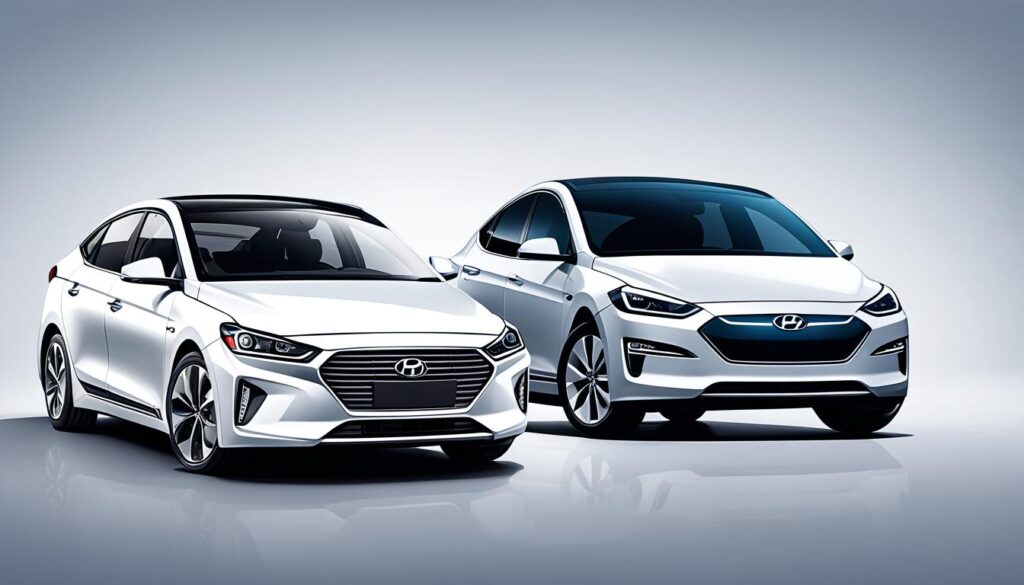
Initial Pricing Influence on Ioniq 5 Depreciation
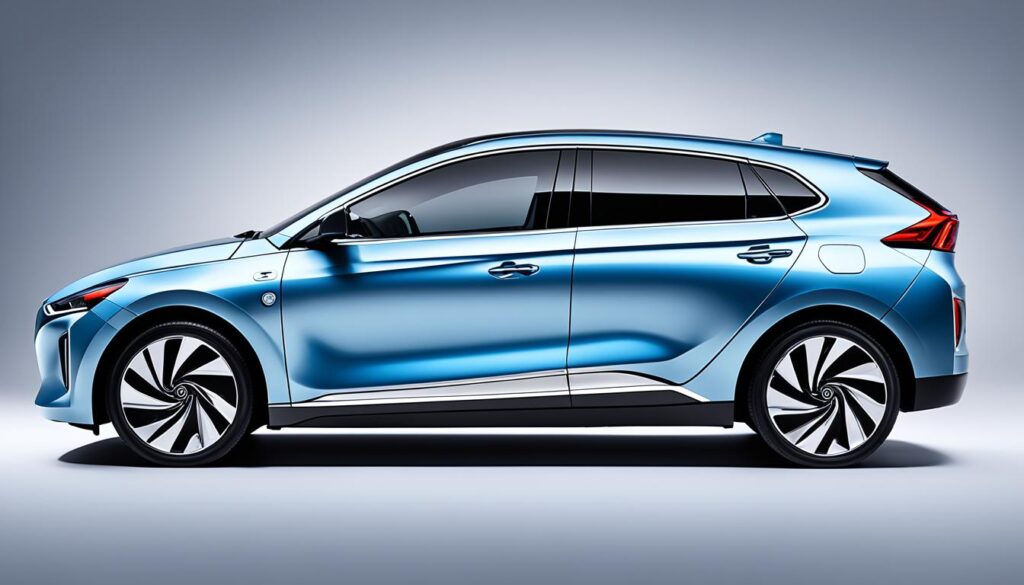
Looking at the 2024 Hyundai Ioniq 5 price influence shows us something important. Dealership deals and the vehicle’s starting price really shape how quickly its price goes down. While smart pricing strategies help, the overall market still plays a big role in how electric cars lose value.
One clear example shows in recent electric vehicle (EV) price drops. For instance, eight EV models saw their value fall by over 28% in a year. Among these, the Hyundai Ioniq 5 stands out. Its worth is affected by the market and big discounts on leases that lower what people pay to get one.
The case of the Kia EV6 and Hyundai Ioniq 5 tells us more about leasing’s impact. After the Kia EV6 came out in 2022 with good lease offers, the Ioniq 5 followed. It had similar lease deals. This made their resale value go down.
The Nissan Leaf and Chevy Bolt EV show us examples of EVs losing a lot of their value fast. This is due to many price cuts and problems with the cars.
However, the Volkswagen ID.4’s situation is different. Even though it made up a good part of VW’s sales, it still lost value.
The Ford Mustang Mach-E was once very popular. But as newer models come out, the older ones lose their value. This shows how the price strategy of a car affects how much value it keeps or loses. It especially shows in the 2024 Hyundai Ioniq 5’s situation, reflecting the wider trend of EV prices dropping fast.
Real-World Factors Affecting Hyundai Ioniq 5 Depreciation
Understanding the factors behind Hyundai Ioniq 5 depreciation is crucial. A key point is technological reliability. This ensures the car stays advanced in electric vehicle (EV) tech and meets consumer needs. If technology fails or becomes outdated quickly, the car’s value may drop. People then seek newer, more dependable models.
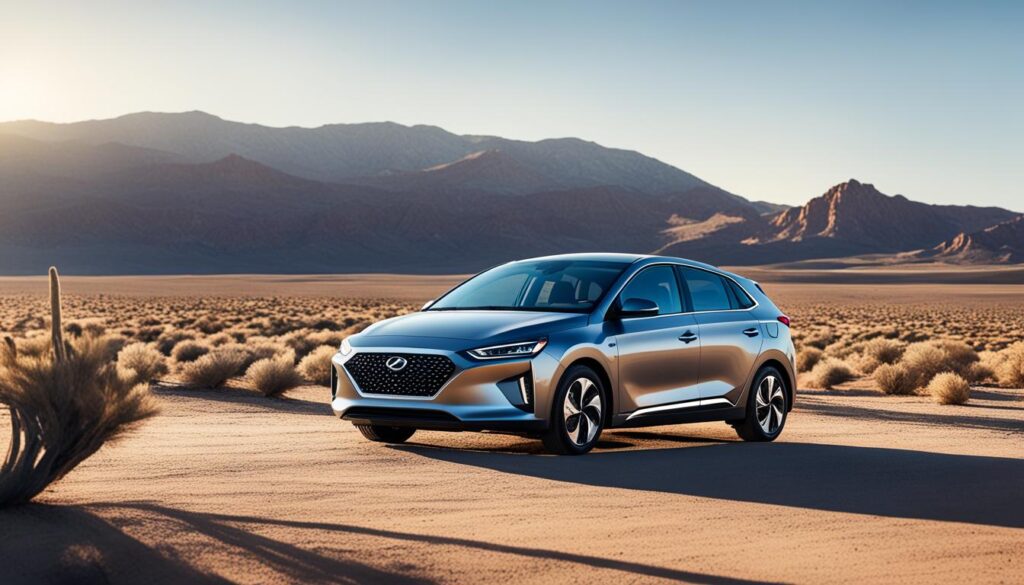
The build quality of the Hyundai Ioniq 5 also plays a role. Known for its solid design and manufacturing, it helps slow depreciation. A car that holds up well can keep its value better than those that show age or damage sooner.
Another important factor is the market’s hesitation to trade-in EVs. Dealers often worry about electric cars’ future value. This can mean lower trade-in offers, affecting the Hyundai Ioniq 5’s value. Plus, a surplus of a model can reduce its price too.
- Technological advancements and updates
- Consumer confidence in long-term EV viability
- Manufacturing quality and durability
- Trade-in practices and market absorption rates
Knowing these depreciation factors is important for anyone interested in the Hyundai Ioniq 5. It helps buyers and owners understand the electric vehicle’s value over time. This knowledge supports making well-informed decisions about purchasing and owning this car.
Owner Perspectives on Hyundai Ioniq 5 Depreciation Trends
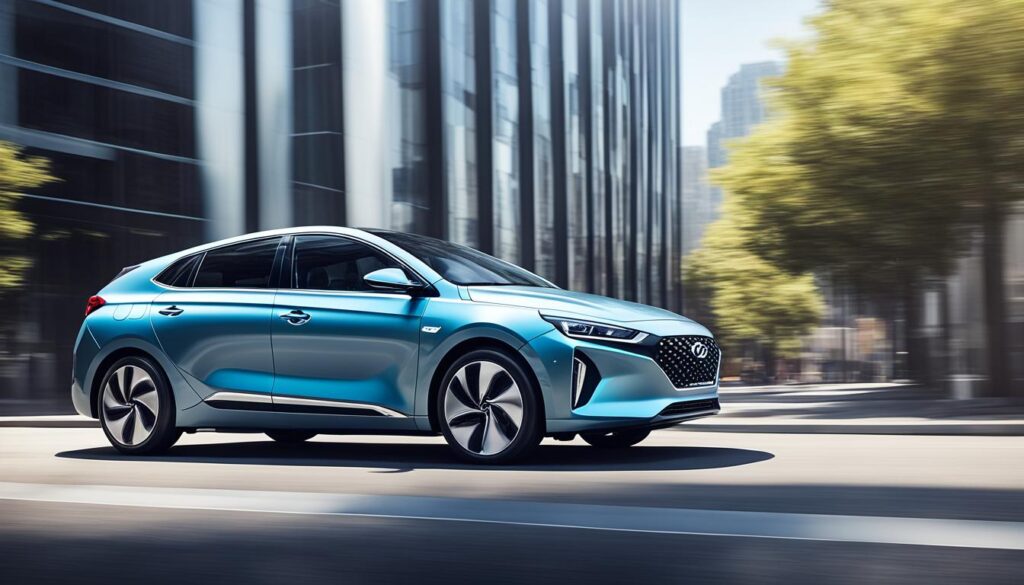
The electric vehicle (EV) market is growing fast. The Hyundai Ioniq 5’s role is crucial for understanding depreciation trends from the consumer’s experience. This car, ranking sixth in top-selling EVs in 2023, holds a big market spot.
Looking at the Hyundai Ioniq 5 from an owner’s view shows key factors behind its depreciation. The car’s competitive price is often compared to the Tesla Model Y. The Model Y starts at $43,990 and can go up to $52,490 with extra costs.
Owners also need to think about home charging costs, between $2,500 and $4,000, and yearly insurance of about $1,500 for a Model Y. Expenses like tire replacements, about $1,000, are similar for Hyundai Ioniq 5 owners. These costs affect how attractive the Ioniq 5 is on the used market.
Depreciation data shows a Model Y loses $27,225 in value over five years from a $44,000 buying price. Financing a Model Y at 4.75% APR for 60 months costs $51,718.25, including interest and tax. Hyundai Ioniq 5’s value also faces these financial challenges, influenced by up to $7,500 in government tax credits.
In the UK, only 16.5% of cars sold in 2023 were electric. Private buyers made up only a fifth of these sales. The EV market is changing, affecting depreciation. There was a 10.6% average discount on new electric cars by the end of 2023. Demand for 0–5-year-old used EVs went up by 52%. The Hyundai Ioniq 5 is doing well in these changing trends, selling faster than gas and diesel cars.
Looking at car values after 60 months shows new vehicles keep about 42.4% of their original price. Top resale models like Toyota keep around 59%. These numbers show why picking a car with strong resale value matters. Hyundai Ioniq 5 owners think about this when considering depreciation along with reliability, tech features, and demand.
Kelley Blue Book gives awards for cars that keep their value best over five years. This honor shows vehicle specs and economic conditions that matter for Hyundai Ioniq 5’s depreciation from an owner’s view.
Insights on Hyundai Ioniq 5 Resale Value from Recent Buyers
New Hyundai Ioniq 5 owners pay close attention to the car’s resale value before buying it. The rapidly growing electric vehicle (EV) market makes the resale value important to customers.
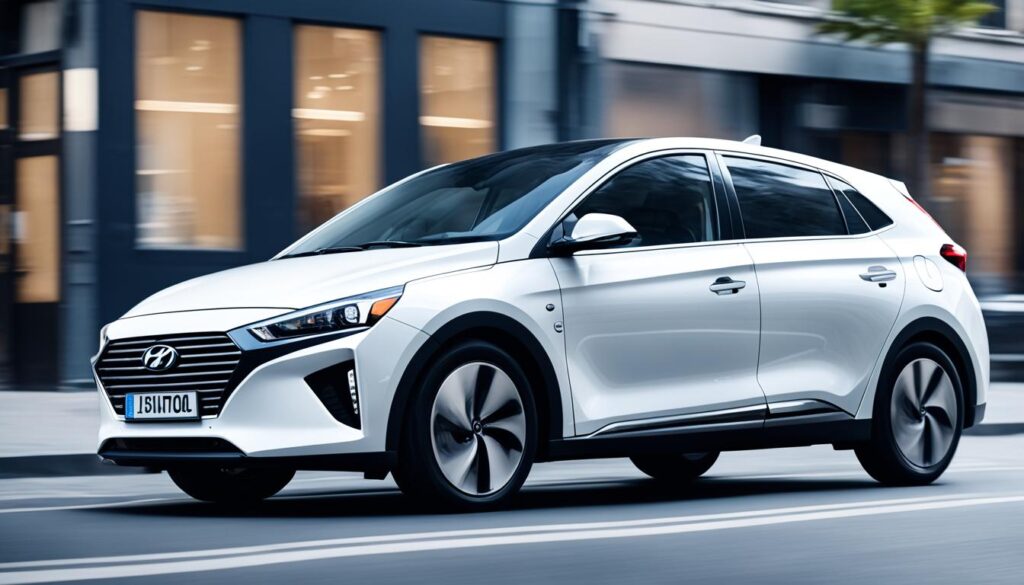
Interested buyers of the 2024 Hyundai Ioniq 5 value the benefits of an EV with expected high resale value. They dive deep into discussions with dealers and explore incentives. These efforts aim to understand the car’s value maintenance over time.
The 2024 Hyundai Ioniq 5’s value is expected to stay strong. This matches a bigger trend where EVs could soon beat gas cars in resale value. Kelley Blue Book’s list shows top cars with best resale values, hinting the Ioniq 5’s potential.
| Rank | Vehicle | 5-Year Resale Value % |
|---|---|---|
| 1 | 2024 Ford Bronco | 66.7% |
| 2 | 2024 Toyota Tacoma | 62.6% |
| 3 | 2024 Mercedes-Benz G-Class | 61.2% |
| 4 | 2024 Toyota Tundra | 60.4% |
| 5 | 2024 Chevrolet Corvette | 59.0% |
| 6 | 2024 Toyota GR Supra | 57.2% |
| 7 | 2024 Toyota Prius | 55.3% |
| 8 | 2024 Toyota 4Runner | 54.6% |
| 9 | 2024 Porsche 718 Cayman | 54.2% |
| 10 | 2024 Ford Maverick | 54.0% |
Kelley Blue Book’s data brings excitement to Hyundai Ioniq 5 buyers. With Toyota winning the Best Resale Value Brand often, Ioniq 5 aims to match the top cars’ 59% return after five years.
Hyundai Santa Fe’s resale values give Ioniq 5 buyers hope. Its costs over 5 years and the money it keeps show the potential of Ioniq 5. Owners believe the Ioniq 5 could do as well or better thanks to its new features.
The move to electric vehicles and Hyundai’s growing reputation promise good resale value for the Ioniq 5. This shift could benefit the resale value of EVs in the future.
2024 Hyundai Ioniq 5 Residual Value Forecasts
The move towards electrification in cars is a big deal. It matters for people thinking about the total cost of owning a car. The 2024 Hyundai Ioniq 5‘s value over time shows its lasting appeal. It also shows the confidence in Hyundai’s electric tech across European countries. The electric Ioniq 5 holds its value well, with rates at 47% in Germany and 27% in the UK. The hybrid model also keeps its worth, ranging from 31% in France to 50% in Spain.
When compared to others like the BMW i3 and Volkswagen e-Golf, the Ioniq 5 stands out. Its value stays strong, partly because of its great features. These include a 280 km range on one charge and low CO2 emissions of only 79 g/km. Plus, Hyundai’s promise of quality with a Five Year Unlimited Mileage Warranty adds to its appeal. This includes an 8-year warranty for the high-voltage battery. So, the Ioniq 5 is top-notch in efficiency and customer peace of mind.
The Ioniq 5 Hybrid stands out in how it drives, beating diesel and hybrid rivals. Its combination of low energy use, big interior space, and smooth handling make it a leader. It’s a shining example of Hyundai’s innovation. Looking forward, it’s expected to keep its value well. This makes it a wise pick for people who care about the environment and those managing car fleets in 2024 and the years to come.
